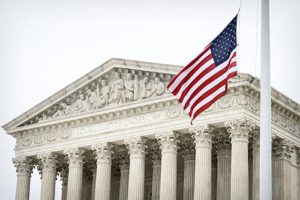 The South Carolina Supreme Court issued a major decision on August 11, 2021 changing the law by making it easier for injured workers to receive compensation for many work place injuries. In Keene v. CNA Holdings, the Supreme affirmed a $14 million dollar verdict ($2 million in punitive damages) for the family of Dennis Seay, who died from exposure to asbestos while working in a plant owned by Celanese in Spartanburg, South Carolina. The Court rejected Celanese’s defense that it was the “statutory employer” of Mr. Seay and therefore immune from suit under the state workers’ compensation act. Mr. Seay was a maintenance worker who was directly employed by Daniel Construction to maintain the machinery in the Celanese facility which produced polyester fiber.
The South Carolina Supreme Court issued a major decision on August 11, 2021 changing the law by making it easier for injured workers to receive compensation for many work place injuries. In Keene v. CNA Holdings, the Supreme affirmed a $14 million dollar verdict ($2 million in punitive damages) for the family of Dennis Seay, who died from exposure to asbestos while working in a plant owned by Celanese in Spartanburg, South Carolina. The Court rejected Celanese’s defense that it was the “statutory employer” of Mr. Seay and therefore immune from suit under the state workers’ compensation act. Mr. Seay was a maintenance worker who was directly employed by Daniel Construction to maintain the machinery in the Celanese facility which produced polyester fiber.
Workers’ compensation is of course an existing remedy for workers injured on the job, though the benefits provided through that program are limited in amount. Under workers’ compensation, developed in the 1930’s, an injured worker gave up his right to sue his employer in exchange for what was supposed to be a swift and less contested process for compensation. The employer enjoyed immunity from lawsuits in court and the worker was entitled to compensation without having to prove fault by the employer. But the question of who was the employer got complicated.
Under modern business relationships, many employers decided to contract out portions of the work necessary to the functioning of their enterprises. For example, a manufacturing company may contract with third parties who in turn hire their own employees to provide transportation or maintenance services to the manufacturer. If a worker of a subcontractor is injured on the job at the manufacturer’s plant due to manufacturer’s negligence, is the manufacturer the “employer” and therefore immune from civil tort liability under the workers’ compensation statutory scheme? In other words, does the manufacturer get to argue that the injured worker was in essence his “employee”, despite the worker being hired by the subcontractor? Is the worker a “statutory employee” since he is doing work that is important part or an integral part of the manufacturer’s business? If the worker is an “employee” than the manufacturer is an “employer” and thus immune from a civil lawsuit alleging negligence. Whether an injured worker was a statutory employee was often not clear. For over 80 years the courts struggled with this question, analyzing each set of facts on a case by case basis, many times coming to unpredictable results.
Enter the Keene case. Kassel McVey represented Mr. Dennis Seay who was a skilled mechanic hired by Daniel to provide maintenance work to Celanese, the polyester fiber manufacturer.
Celanese was in the business of making fiber and chose not to employ its own maintenance workers. The Celanese plant was full of machinery that contained asbestos insulation. In maintaining the equipment, Mr. Seay came into constant contact with asbestos and developed mesothelioma, a specific cancer caused by asbestos exposure. He ultimately died from his disease. Kassel McVey brought suit against Celanese for negligently providing a dangerous workplace. Celanese defended the action by stating it was immune from suit since Mr. Seay was really its employee despite being hired by Daniel. Celanese argued the plant could not operate without the maintenance provided by Seay. Seay was important and integral to the plant operation and was thus a part of the “trade, business or occupation” of Celanese. According to
Celanese, Mr. Seay should be deemed one of its own employees. If Mr. Seay was an employee then Celanese was immune from any lawsuit over conditions in its plant. If immune, it would not matter that Celanese was aware of the dangers of asbestos in its plant and took no action to warn workers of this potentially fatal condition.
Theile McVey of Kassel McVey tried the case in front of a Spartanburg County jury, along with colleagues from the firm of Simon Greenstone Panatier of Dallas, Texas. McVey argued to the trial judge, Judge Gary Hill, now on the South Carolina Court of Appeals, that Mr. Seay was not a statutory employee of Celanese and therefore that company enjoyed no immunity for its wrongful acts in failing to keep the plant safe. McVey convinced Judge Hill that South Carolina law required a worker to be considered a statutory employee only if the work performed was actually a part of the business of Celanese and not simply important to Celanese. Mr. Seay’s important work was not part of the business of Celanese because the company was in the business of fiber production and not maintenance. This was evident by the fact that none of the Celanese directly-hired-employees performed maintenance work. Celanese employees were hired to run the fiber manufacturing machines, not maintain them. Celanese purposely chose to limit its business to fiber production and not maintenance.
Judge Hill agreed. He allowed the case to proceed to trial and denied Celanese motions to dismiss. Ultimately, a jury returned a verdict for $14 million dollars in actual damages and $2 million dollars in punitive damages. Celanese appealed to the South Carolina Court of Appeals. McVey put together a team of appellate lawyers to challenge the appeal. Mr. Seay died during the long litigation process. His estate won in the Court of Appeals. The long road to justice was made longer by Celanese’s actions to appeal to the South Carolina Supreme Court. After a six year long battle Mr. Seay’s family finally won in the Supreme Court. Justice John Few wrote in his 3-2 decision in favor of the Seay family that the original purpose of the workers compensation act would not be served by granting Celanese immunity for its wrongful conduct. Justice Few recognized that Celanese chose to limit its business operations to fiber production and not maintenance. To honor that decision, the Court found Mr. Seay, hired by Daniel to provide maintenance work, was not a part of the Celanese business. Therefore, Celanese could enjoy no immunity from suit.
Certainly Celanese will move before the Supreme Court for reconsideration of its decision. That is to be expected. They will force this family to continue to wait for justice. But the end of this long road is near. A favorable outcome is highly anticipated.
In addition to providing compensation to the Seay family, this legal opinion will impact working families across the state. Other injured workers, injured in similar circumstances, will find the road to compensation easier to navigate.
Personal Injury Lawyers 1330 Laurel Street Columbia, SC 29201 Phone: 803-256-4242
Mailing Address
Post Office Box 1476
Columbia, South Carolina 29202
Fax: (803) 256-1952
Copyright © 2023 John D. Kassel, Attorney at Law, LLC. All rights reserved. Privacy Policy I Terms of Service | Disclaimer
This website is designed for general information only. The information should not be construed to constitute formal legal advice or the formation of a lawyer/client relationship. The results and testimonials listed on this website are specific to the facts and legal circumstances of specific cases and should not be used to form an expectation that the same results could be obtained for other clients in similar matters. This list is not a description or characterization of the quality of the firm's representation, it is not intended to compare one attorney's work to another and is in no way a guarantee of a specific result for your case.

